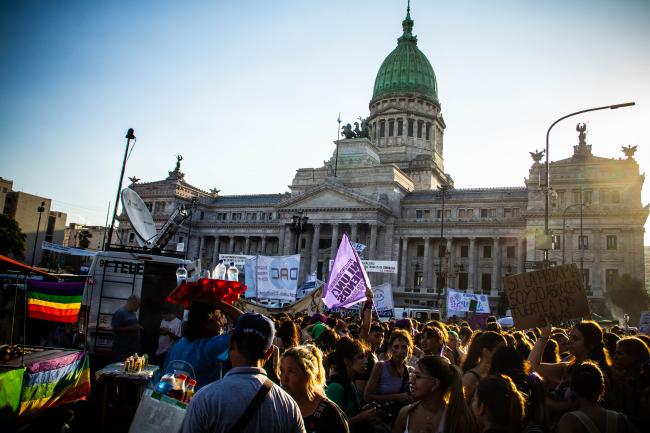
Leer este artículo en español.
Translated by Liza Schmidt.
In Buenos Aires, no one has any doubts (or evidence) that 9 de Julio is the widest avenue in the world. After midday on March 8, the street was closed to traffic but full of women, lesbians, trans, and non-binary people arriving to mingle with their friends and allies. Although the march does not begin until 4 pm, people begin arriving hours earlier to ensure that the demonstration is as orderly as possible.
The heat wave’s blazing sun seems to slice through the cement. Taking advantage of shade from nearby trees and the stands of activist collectives, many sit on the ground to decorate posters and construct roadside stations for water and first aid. The most important are the “power” posts—where people bedeck themselves with sparkles, glitter, face paints, and other body decor—because if the fourth feminist wave has created anything besides new demands, it is a lot of glitter.
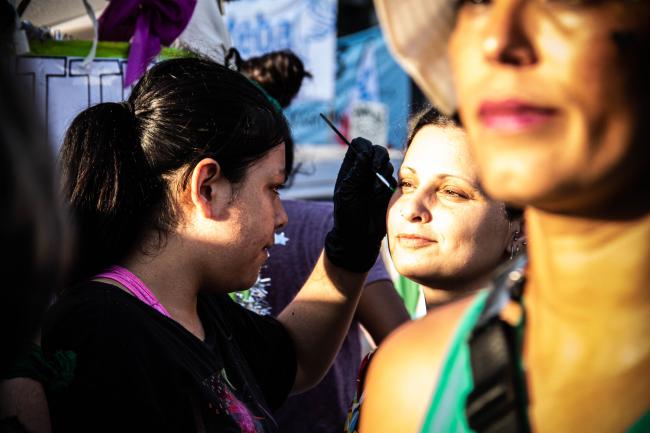
In recent years, there has been a widespread effort to make the history behind Women’s Day universally known. It all traces back to revolts by U.S. suffragettes at the beginning of the 19th century and the assemblies and strikes by European socialist women demanding a reduced 10-hour workday, equal pay, better conditions, the end of child labor, the right to vote, and vocational training. At different points around the world, the need for a day focused on women’s demands was growing.
In 1911, shortly after the International Conference of Working Women in Copenhagen decreed the first International Day of Working Women, the Triangle Shirtwaist factory in New York City burned. Locked inside by their managers, 146 workers died, the majority women. These events sparked the creation of a key date in the feminist calendar that, after many twists and turns, was crystallized into International Women’s Day on March 8.

As the century continued, feminist movements won rights that benefitted all of society, like the universal rights to vote and divorce. In Argentina, the movement was so powerful that it not only achieved the creation of laws guaranteeing individual freedoms—including marriage equality in 2010 and legal abortion in 2020—but also organized groundbreaking and strategic events, like the Plurinational Encounter for Women, Lesbians, Trans, and Non-Binary People that takes place every year in October.
Meanwhile, Women’s Day was increasingly trivialized, becoming another opportunity to promote consumerism and normalize offensive statements relating women’s value to beauty, maternity, and duty to carry out unpaid care work.
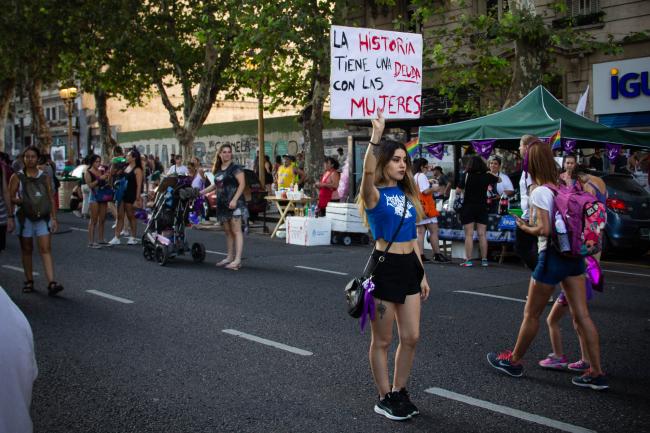
In Latin America, the dream of U.S. suffragettes and European socialist women took hold, but with the added awareness that our experience of oppression is intersected by being brown, dissident, and poor. Latin American feminism grew alongside the anti-imperialist movements in the region. In Argentina, the call to legalize abortion and grant sexual and reproductive rights united many different groups under the National Campaign for the Right to Abortion in 2005.
In 2017, lesbian, trans, non-binary, and women workers organized a massive strike against the neoliberal government led by Mauricio Macri, who had upheld restructuring and repressive policies since taking office. Until then, not even the largest unions had managed to organize at this scale to curb the ruling rightwing coalition Cambiemos. Growing feminist movements from around the region and across the globe joined the initiative. Now, strikes are held around the world to amplify the voices of those too often silenced and ignored and to make their absence felt in the systems that they invisibly sustain.
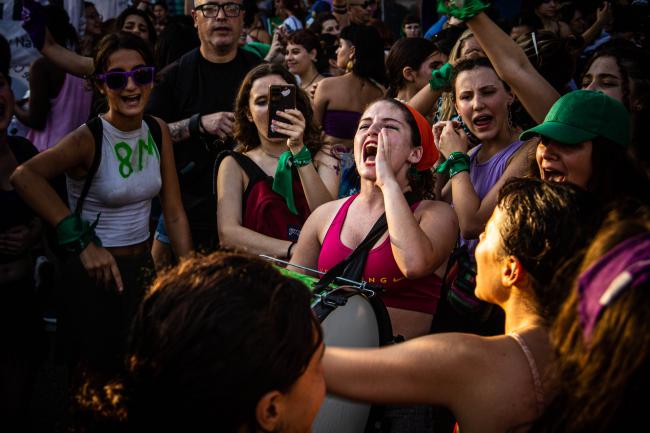
“We have spent decades, many years, rowing [against the current] to be included in the agendas and to make it clear that March 8 is not a day of celebration, but a day of struggle because the female gender, in all its forms and expressions, has been violated throughout history, trampled by the patriarchy,” comments Daniela Emma Castro, leader of the Movimiento Popular Nuestramérica and regional director of Sexual Diversity Policies. Upon taking this position, Castro became the first trans public official in the province of Buenos Aires as part of the Ministry of Women, Gender, and Diversity, which was created a few months before she assumed the post. Castro continues to support—in the office and in the streets—the demands of her sector, like the ratification of decree 721/2020, which establishes a trans labor quota in the public sector, guaranteeing a minimum of 1 percent of all roles and contracts for travesti, transsexual, and transgender people [Editor’s note: these three terms are used widely in Argentina in reference to trans identities].
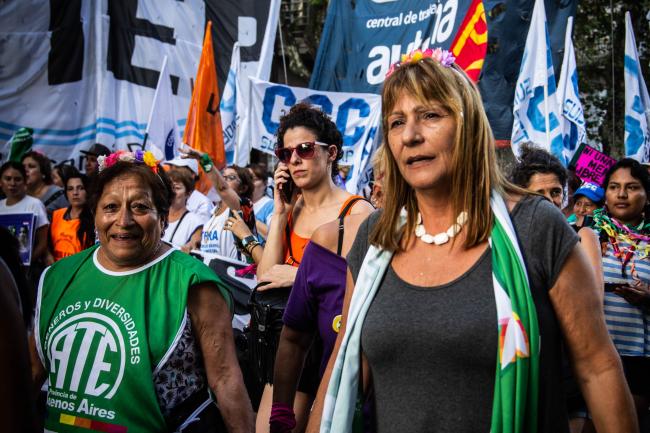
“These violations unite us,” Castro says. “Although together we have achieved wonderful cultural change, it has cost us dearly. So to come together on these days where we see everyone marching together, in sisterhood, defending rights and designing futures, is really moving.”
Well into the afternoon, the masses of participants make it difficult to walk on the wide avenue and accompanying streets of the center. This is replicated in every corner of the country. The schedule, the order of the march, the main slogans, and the closing statement were all organized and agreed upon by movement representatives and assembly spokespeople in the weeks before the march. The columns of people separated into parties and political organizations advance steadily towards the National Congress, led by a giant banner proclaiming, “with this justice, there are no rights and no democracy. The debt is with the workers. Feminist Strike 8M 2023.”
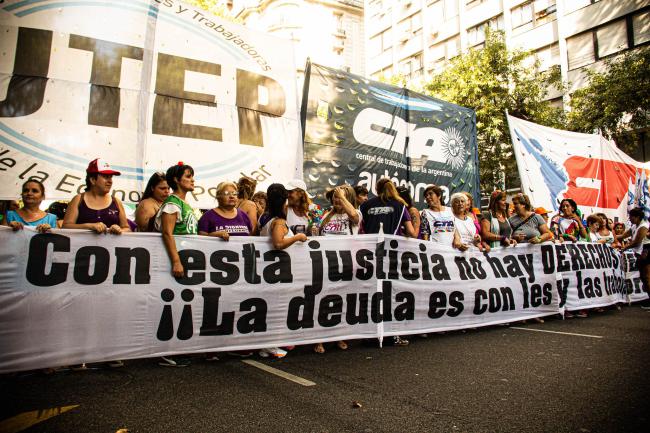
Although the march is well attended, there are fewer participants than during pre-Covid years. The decrease in participation is not entirely due to the pandemic. The movement has been in retreat since the rise to power of the rightwing and the resulting rollback of rights for the popular classes. Many have had to abandon their struggles in the streets to support those who, more and more, have been left without work, without housing, and without food. For the most part, it is women who take charge of family and community care work.
The division of labor remains deeply unequal. According to reports by the Ministry of Labor, women earn 27.7 percent less than men in the formal sector and 34.5 percent less in the popular economy. The division of work by gender is even more unequal: women make up 97.5 percent of those cleaning and cooking in private homes, and also carry out 75 percent of unpaid domestic tasks. This revealing data is insufficient because few studies have been done on work that is performed informally, with salaries below the minimum wage and without guarantees, pension contributions, or social security in deeply feminized sectors such as textiles and caregiving. These jobs include the creation of community kitchens and aid to address hunger, substance abuse, and homelessness, among other issues. It is women who assume caregiving roles, not only in the home—their own and others’—but in neighborhoods and communities.
“The impact has been equally hard on all of us, but I believe that we—women, transsexual, transgender, and non-binary people—have a capacity for resilience that other sectors have not had the chance to develop,” reflects Castro. “This also fills us with hope, because we are producers, artisans, artists, we continually bring out what we have inside of us, full of love.”
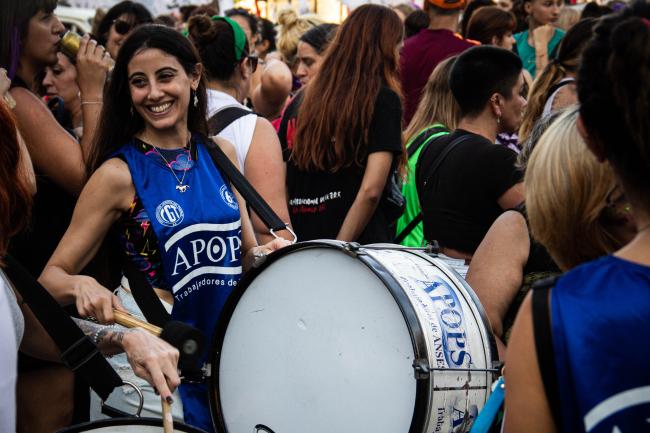
As the march comes to the end of its route, music invites participants to dance while organizers on stage prepare to read the closing statement. The agreed-upon text, as the lead banner predicted, emphasizes the importance of a gender perspective in the law and demands that the foreign debt not be paid by squeezing the already oppressed. It is always difficult to combine the demands of the many groups in the collective, but this last period was marked by the economic adjustments imposed by the International Monetary Fund, causing precarious wages and a lack of market regulation, and an increase in corrupt practices in the judicial system. One example of this is the persecution of democratically elected leaders, like Vice President Cristina Fernández de Kirchner, who in December was convicted of alleged fraud committed during her years (2007-2015) as president and banned from holding public office. Kirchner, who denies the accusations, will appeal the verdict in a process that may take years. The judicial system has also demonstrated a total lack of interest in women’s dignity, like in the 2018 case concerning the rape and murder of Lucía Perez. The court found 16-year-old Perez’s attackers guilty only on drug charges, judging the teen for her behavior—portraying her as promiscuous—rather than the evidence of violence inflicted on her body. Perez’s case sparked nationwide outrage and protests. The verdict was annulled in 2020 on the grounds of gender stereotyping and the trial reopened, with a verdict expected this week.
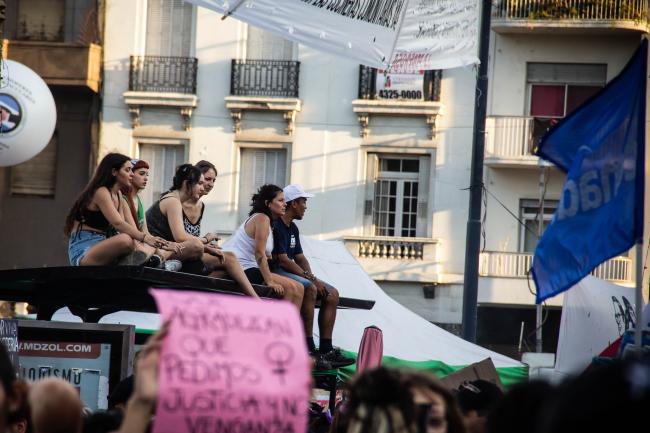
“It is possible that our demands become concrete rights,” says Daniela. “It continues to cost us, because we have parts of the state where machismo still dominates. But it is not possible to think about a new wave of rights, a future for everyone, that does not include a feminist agenda. There is no way to create policies in this country without our full participation.”
At the close of the day, instructions to disperse in an orderly manner and leave the space as they found it sound over the microphone. Any disturbances or mess left in the streets would be the perfect excuse for the media to give the march negative coverage.
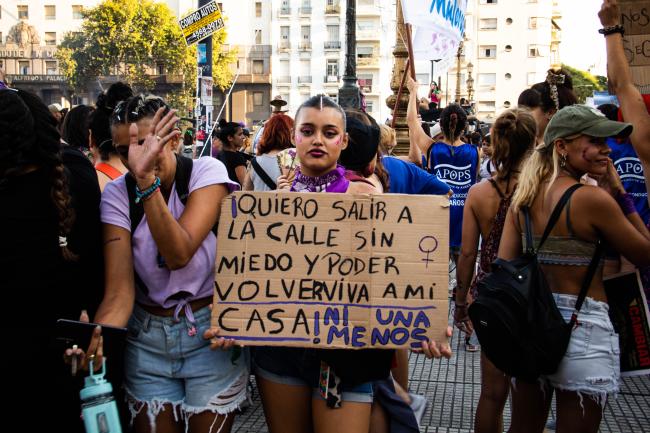
The departure is slow and many take advantage of the opportunity to “ranchar,” or relax for a moment in the company of those they trust, after an entire day of guaranteeing a safe and smooth march. In their first break of the day, the strikers take the chance to hug each other and to sing their famous chants—”careful machistas, Latin America will be feminista”—and maybe plan where to go to celebrate a moment longer.
Faced with the social, economic, and humanitarian crises created by climate change and global inequality, sometimes we can’t avoid feeling pessimistic, forced to postpone the transfeminist demands of the collective, like historic reparations for travesti and trans people for the violence they have endured, the right to a pension, and social protections for sex workers and caregivers. But days like today force us to focus on the horizon of equality and remember that there is still a force of activists who build battle fronts in every space they inhabit, be it a school or a hospital, a company or a sidewalk stand. It is a body of struggle with the capacity to build consensus on political matters and create our own agendas, like pushing for wages for invisible labor and demanding that laws on sexual education, contraception, and reproductive choice be upheld.
In the streets and everywhere, we find each other in sisterhood and with renewed conviction that if we fight together, the patriarchy will fall. We will tear it down.
Virginia Tognola is a writer interested in politics, culture and humanitarianism and an activist in the Movimiento Popular Nuestramérica. She has published in media such as International Progressive, ROAR Magazine, New Internationalist, and NACLA on social struggles and the conquest of rights in the region.

